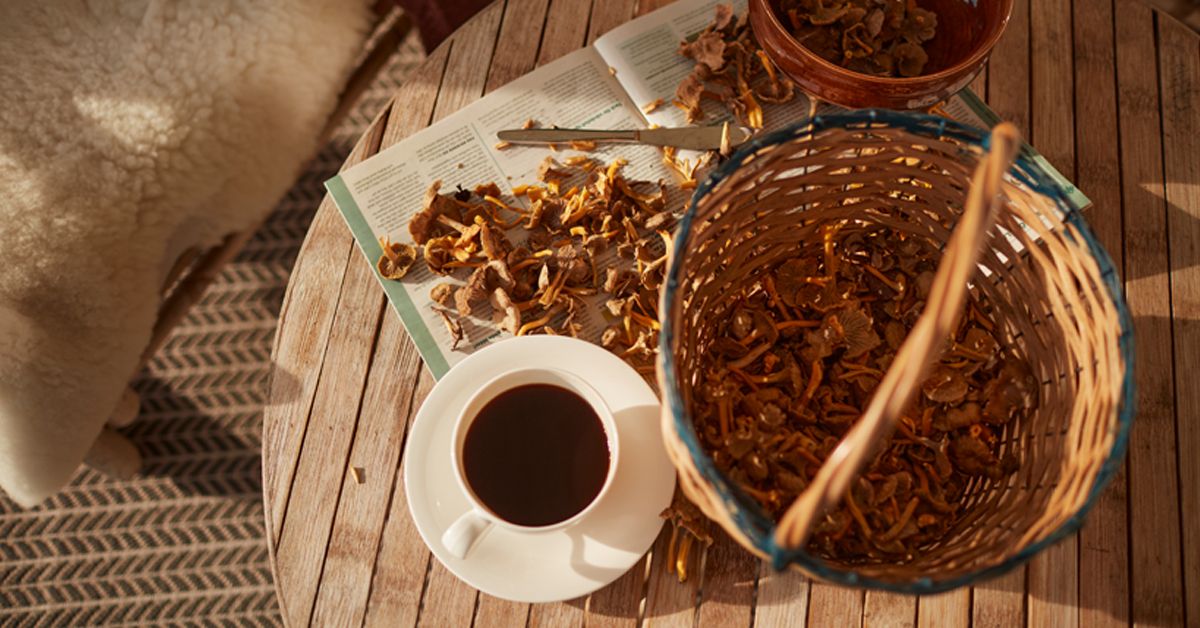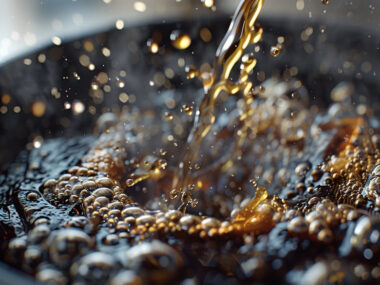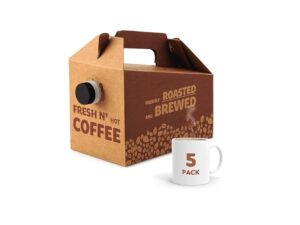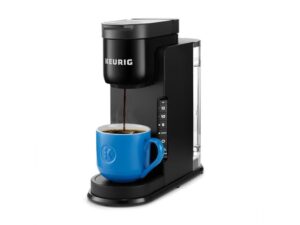Mushroom coffee is gaining popularity among health enthusiasts. If you’re wondering How Much Caffeine in Mushroom Coffee, this guide breaks down the details.
Mushroom coffee is a blend of regular coffee and medicinal mushrooms like Chaga or Lion’s Mane. It’s celebrated for its potential health benefits, such as improved focus and immune support. But many people wonder about the caffeine content in this trendy drink.
Is it similar to regular coffee, or does it offer a milder kick? Understanding the caffeine levels can help you decide if mushroom coffee fits your lifestyle. In this post, we’ll explore the caffeine content in mushroom coffee and what it means for you. Stay tuned to learn more about this unique beverage and its potential effects on your day.

Credit: www.amazon.com
Mushroom Coffee Basics
Mushroom coffee has gained popularity among health enthusiasts. This unique drink combines the energy-boosting effects of caffeine with the health benefits of medicinal mushrooms. Understanding the basics of mushroom coffee can help you decide if it’s the right choice for you.
What Is Mushroom Coffee?
Mushroom coffee is a blend of ground coffee beans and powdered medicinal mushrooms. It offers a unique combination of flavors and health benefits. The coffee part provides the familiar taste and caffeine kick, while the mushrooms add a range of nutrients and compounds.
Some key features of mushroom coffee include:
-
Lower caffeine content: Mushroom coffee usually has less caffeine than regular coffee. This makes it a great option for those sensitive to caffeine.
-
Enhanced focus and energy: The blend of coffee and mushrooms can provide a more balanced energy boost, reducing the jitters and crashes associated with regular coffee.
-
Health benefits: Medicinal mushrooms have been used for centuries in traditional medicine. They offer various health benefits, such as boosting the immune system and reducing inflammation.
Mushroom coffee comes in various forms, including instant powder, ground coffee, and coffee pods. You can enjoy it like regular coffee, with hot water or milk, and sweeteners if desired.
Types Of Mushrooms Used
Mushroom coffee typically includes several types of medicinal mushrooms. Each type offers unique benefits and contributes to the overall health-promoting effects of the drink.
Common mushrooms used in mushroom coffee include:
-
Reishi: Known for its calming properties, reishi helps reduce stress and improve sleep quality.
-
Chaga: This antioxidant-rich mushroom supports the immune system and has anti-inflammatory properties.
-
Lion’s Mane: Lion’s mane is famous for its brain-boosting effects. It enhances cognitive function and memory.
-
Cordyceps: Cordyceps increases energy levels and supports physical performance. It’s often used by athletes.
Here’s a table summarizing the benefits of each mushroom:
|
Mushroom |
Key Benefits |
|---|---|
|
Reishi |
Reduces stress, improves sleep |
|
Chaga |
Boosts immunity, anti-inflammatory |
|
Lion’s Mane |
Enhances cognitive function, memory |
|
Cordyceps |
Increases energy, supports performance |
Incorporating these mushrooms into coffee creates a drink that offers both mental and physical benefits. Each cup provides not just a caffeine boost, but also the numerous advantages of medicinal mushrooms.
Caffeine Content
Mushroom coffee is gaining popularity due to its unique blend of mushrooms and coffee. People often wonder about the caffeine content in this beverage. Understanding how much caffeine is in mushroom coffee can help you make informed choices about your daily intake. Let’s dive into the details of caffeine content in mushroom coffee.
Comparing Caffeine Levels
The caffeine levels in mushroom coffee can vary based on the brand and type of mushrooms used. Generally, mushroom coffee has less caffeine than regular coffee. Here’s a comparison to give you a clearer picture:
|
Beverage |
Caffeine Content (per 8 oz cup) |
|---|---|
|
Regular Coffee |
95 mg |
|
Mushroom Coffee |
50-60 mg |
|
Decaf Coffee |
2 mg |
As shown in the table, mushroom coffee usually contains about half the caffeine of regular coffee. This makes it a good option for those sensitive to caffeine.
Some benefits of lower caffeine content in mushroom coffee include:
-
Reduced anxiety and jitteriness
-
Better sleep quality
-
Lower risk of caffeine addiction
Choosing mushroom coffee can help you enjoy the taste of coffee with fewer side effects from caffeine.
Factors Affecting Caffeine
Several factors can affect the caffeine content in mushroom coffee. Understanding these factors can help you choose the right product for your needs:
-
Type of Coffee Beans: The type of coffee beans used in mushroom coffee can affect the caffeine content. Arabica beans have less caffeine compared to Robusta beans.
-
Roasting Process: The roasting process can influence caffeine levels. Darker roasts tend to have slightly less caffeine than lighter roasts.
-
Mushroom Variety: Different mushrooms used in the blend can impact the overall caffeine content. Common mushrooms used include Reishi, Lion’s Mane, and Chaga, which do not add caffeine.
-
Brewing Method: How you brew your mushroom coffee can also play a role. Methods like espresso can result in higher caffeine content compared to drip coffee.
By considering these factors, you can better understand the caffeine content of your mushroom coffee. This can help you manage your caffeine intake effectively.
Being aware of these factors also allows you to customize your mushroom coffee experience to suit your taste and health preferences.
Health Benefits
Mushroom coffee is gaining popularity as a healthier alternative to traditional coffee. It combines mushrooms with coffee to create a drink that has unique health benefits. Understanding these benefits can help you decide if this beverage is right for you.
Potential Advantages
Mushroom coffee offers several potential advantages for your health. Here are some key points to consider:
-
Reduced Caffeine Intake: Mushroom coffee typically contains less caffeine than regular coffee. This can help reduce anxiety, improve sleep quality, and lower the risk of caffeine-related side effects.
-
Enhanced Immune System: Certain mushrooms like Reishi and Chaga have immune-boosting properties. They can help your body fight off infections and illnesses.
-
Rich in Antioxidants: Mushrooms are packed with antioxidants, which help protect your cells from damage caused by free radicals. This can lead to better overall health and a lower risk of chronic diseases.
-
Improved Digestion: Some types of mushrooms contain prebiotics, which promote healthy gut bacteria. A balanced gut can lead to better digestion and nutrient absorption.
-
Enhanced Mental Clarity: Mushrooms like Lion’s Mane are known for their cognitive benefits. They can improve focus, memory, and overall mental clarity.
Here is a comparison of some nutrients found in mushrooms and regular coffee:
|
Nutrient |
Mushroom Coffee |
Regular Coffee |
|---|---|---|
|
Caffeine |
30-50 mg |
95 mg |
|
Antioxidants |
High |
Moderate |
|
Prebiotics |
Present |
Absent |
|
Immune-Boosting Compounds |
Present |
Absent |
Mushrooms Vs. Coffee
Comparing mushrooms to coffee reveals several differences. Here is a breakdown:
-
Caffeine Content: Regular coffee has around 95 mg of caffeine per cup. Mushroom coffee has less, ranging from 30-50 mg. This reduction can minimize jitteriness and improve sleep.
-
Nutritional Value: Mushrooms add nutritional value to coffee. They contain vitamins, minerals, and antioxidants not found in regular coffee.
-
Health Benefits: Mushrooms bring unique health benefits. Reishi mushrooms can reduce stress and improve sleep. Chaga mushrooms have anti-inflammatory properties.
Here is a table comparing key benefits of mushrooms and regular coffee:
|
Benefit |
Mushroom Coffee |
Regular Coffee |
|---|---|---|
|
Stress Reduction |
High |
Low |
|
Sleep Improvement |
High |
Low |
|
Anti-Inflammatory |
High |
Moderate |
|
Digestive Health |
High |
Low |
Understanding these differences helps you see why mushroom coffee is a healthy choice. It offers added nutrients and reduced caffeine. This can lead to better health and well-being.

Credit: www.healthline.com
Brewing Techniques
Mushroom coffee is gaining popularity because of its unique flavor and lower caffeine content. Understanding the various brewing techniques can help you enjoy the perfect cup every time. Whether you prefer a strong brew or a milder taste, the right method can make all the difference. Let’s dive into the best brewing techniques for mushroom coffee.
Best Brewing Methods
There are several ways to brew mushroom coffee, each offering a unique experience. Here are some of the best methods to consider:
-
French Press: This method allows the coffee to steep, extracting more flavors from the mushrooms and coffee grounds. Use coarse ground coffee and mushroom powder. Steep for 4 minutes for a rich taste.
-
Pour Over: This technique offers a cleaner, smoother flavor. Use a medium grind and pour hot water over the grounds slowly. This method lets you control the strength and flavor.
-
Espresso Machine: For a strong, concentrated brew, use an espresso machine. Mushroom coffee can be brewed in the same way as regular espresso. Adjust the grind size and tamping pressure to get the best flavor.
-
Cold Brew: This method is perfect for a refreshing drink. Mix coarse ground coffee and mushroom powder with cold water. Let it steep in the fridge for 12-24 hours. Strain and enjoy a smooth, less acidic coffee.
Each method has its own benefits and can affect the caffeine content. Here is a table to summarize the brewing methods and their impact on flavor and caffeine levels:
|
Brewing Method |
Flavor Profile |
Caffeine Content |
|---|---|---|
|
French Press |
Rich and Full-Bodied |
Medium |
|
Pour Over |
Clean and Smooth |
Medium to Low |
|
Espresso Machine |
Strong and Concentrated |
High |
|
Cold Brew |
Smooth and Less Acidic |
Low |
Flavor Considerations
The flavor of mushroom coffee can vary greatly depending on the brewing method. Here are some points to consider:
-
French Press: The longer steeping time extracts more flavors, making the coffee rich and full-bodied. This method highlights earthy notes from the mushrooms.
-
Pour Over: This method offers a clean and smooth taste. It balances the coffee and mushroom flavors well, making it ideal for those who prefer a lighter brew.
-
Espresso Machine: The high pressure of the espresso machine creates a strong and concentrated flavor. This method is best for those who enjoy a bold taste with a caffeine kick.
-
Cold Brew: The extended steeping time in cold water results in a smooth and less acidic coffee. This method brings out subtle flavors and is great for iced coffee lovers.
Flavor and caffeine content are influenced by the brewing technique and the ratio of coffee to mushroom powder. Experiment with different methods to find your perfect cup. Remember, the type of mushrooms used can also impact the taste. Common varieties include Lion’s Mane, Chaga, and Reishi, each adding unique notes to the coffee.
Popular Brands
Mushroom coffee is gaining popularity for its potential health benefits and lower caffeine content. Many people want to know how much caffeine is in mushroom coffee and which brands are popular. This blog post will explore popular brands and compare their products.
Top Mushroom Coffee Brands
Several brands stand out in the mushroom coffee market. These brands offer unique blends and varying caffeine levels. Here are some of the top mushroom coffee brands:
-
Four Sigmatic: Known for its mushroom coffee mix with Lion’s Mane and Chaga mushrooms. Each serving has about 50 mg of caffeine.
-
RYZE Mushroom Coffee: This brand combines six types of mushrooms. It offers around 48 mg of caffeine per serving.
-
MUD\WTR: A coffee alternative with a blend of mushrooms, cacao, and spices. It contains only 20 mg of caffeine per serving.
-
Om Mushroom Coffee Blend: This blend includes Reishi and Lion’s Mane mushrooms. It has about 55 mg of caffeine per serving.
These brands are popular because they offer health benefits and lower caffeine than regular coffee. People who want to reduce caffeine but still enjoy coffee’s taste may prefer these brands.
Product Comparisons
Comparing mushroom coffee products can help you choose the right one. Here is a table that compares caffeine content and key features of top brands:
|
Brand |
Caffeine (mg per serving) |
Key Ingredients |
|---|---|---|
|
Four Sigmatic |
50 |
Lion’s Mane, Chaga |
|
RYZE Mushroom Coffee |
48 |
Six Mushroom Blend |
|
MUD\WTR |
20 |
Mushrooms, Cacao, Spices |
|
Om Mushroom Coffee Blend |
55 |
Reishi, Lion’s Mane |
The caffeine content varies among brands. Four Sigmatic and Om Mushroom Coffee Blend have around 50-55 mg of caffeine. RYZE Mushroom Coffee has slightly less, at 48 mg. MUD\WTR has the least caffeine, with only 20 mg per serving.
Choosing a mushroom coffee depends on your caffeine preference and the health benefits you seek. If you want a low-caffeine option, MUD\WTR might be the best choice. For those who prefer a moderate caffeine level, Four Sigmatic or Om Mushroom Coffee Blend are good options.
Consumer Trends
Mushroom coffee has been creating a buzz lately. As more people seek healthier alternatives, the question arises: How much caffeine is in mushroom coffee? Understanding consumer trends can help shed light on this growing interest.
Rising Popularity
Mushroom coffee is becoming more popular for several reasons. First, it promises health benefits not found in regular coffee. Many believe it can boost immunity, reduce stress, and improve focus. These claims attract health-conscious consumers.
Secondly, mushroom coffee typically contains less caffeine than regular coffee. This appeals to those who want to cut down on caffeine but still need a morning boost. Here are some key reasons for its rising popularity:
-
Health Benefits: Mushrooms like Reishi and Lion’s Mane are known for their medicinal properties.
-
Lower Caffeine: Mushroom coffee usually has about half the caffeine of regular coffee. This makes it suitable for those sensitive to caffeine.
-
Unique Taste: The earthy flavor of mushrooms adds a new dimension to coffee.
-
Eco-Friendly: Many mushroom coffee brands focus on sustainable practices.
Consumers are increasingly interested in products that offer both taste and health benefits. Mushroom coffee fits this demand. As more people share their positive experiences, its popularity continues to grow.
Market Insights
The mushroom coffee market has seen significant growth. According to market research, this trend is expected to continue. Here are some insights into the market:
|
Year |
Market Size (in millions) |
Growth Rate |
|---|---|---|
|
2020 |
$200 |
15% |
|
2021 |
$230 |
20% |
|
2022 |
$276 |
20% |
Several factors contribute to this growth:
-
Increased Health Awareness: People are more conscious about what they consume.
-
Variety of Products: Mushroom coffee is available in instant mixes, ground coffee, and pods.
-
Celebrity Endorsements: Influencers and celebrities promote mushroom coffee, boosting its visibility.
-
Global Reach: Online sales make it accessible to a wider audience.
Market trends indicate a shift towards healthier beverage options. Mushroom coffee is well-positioned to meet this demand. With its unique benefits and growing consumer interest, it’s a trend worth watching.
Potential Side Effects
Mushroom coffee is gaining popularity as a unique blend that combines the benefits of coffee and medicinal mushrooms. While this beverage offers several health benefits, it’s essential to understand the potential side effects. Knowing these can help you decide whether mushroom coffee is right for you.
Caffeine Sensitivity
Some people are more sensitive to caffeine than others. Even though mushroom coffee typically contains less caffeine than regular coffee, it can still affect those who are sensitive. Symptoms of caffeine sensitivity include:
-
Insomnia
-
Jitters
-
Rapid heartbeat
-
Headaches
-
Anxiety
If you experience these symptoms after drinking mushroom coffee, you might be sensitive to caffeine. It’s important to monitor your intake and consider switching to a decaffeinated version if symptoms persist.
Here is a table comparing caffeine content in different beverages:
|
Beverage |
Caffeine Content (mg per 8 oz) |
|---|---|
|
Regular Coffee |
95 |
|
Mushroom Coffee |
50 |
|
Decaf Coffee |
5 |
|
Green Tea |
35 |
Being aware of the caffeine content can help you make an informed choice. If you are caffeine-sensitive, consider starting with a smaller amount of mushroom coffee and gradually increasing it to see how your body reacts.
Mushroom Reactions
Mushrooms used in mushroom coffee, like Reishi, Chaga, and Lion’s Mane, are generally safe for most people. However, some individuals might experience allergic reactions or side effects. Common symptoms include:
-
Rashes
-
Itchy skin
-
Stomach discomfort
-
Nausea
-
Diarrhea
If you notice any of these symptoms, stop consuming the coffee immediately and consult a healthcare provider. People with existing mushroom allergies should avoid mushroom coffee altogether.
Here are some tips to minimize the risk of mushroom reactions:
-
Start with a small amount.
-
Monitor your body’s response.
-
Choose products from reputable brands.
-
Read the ingredient list carefully.
Consult your doctor before adding mushroom coffee to your diet, especially if you have pre-existing health conditions or are taking medication. Understanding the potential side effects can help you enjoy mushroom coffee safely and responsibly.

Credit: www.amazon.com
How To Choose
Mushroom coffee is gaining popularity for its unique blend of coffee and medicinal mushrooms. But how much caffeine does it contain? And how do you choose the best mushroom coffee? These questions are crucial for anyone seeking the benefits of this beverage. Let’s explore the key factors to consider.
Selecting Quality Products
Choosing quality mushroom coffee products can be challenging. Here are some tips to help you make the best choice:
-
Check the Source: Ensure the mushrooms are organically grown. This reduces the risk of contamination from pesticides and other chemicals.
-
Research the Brand: Look for brands with good reputations. Customer reviews and third-party certifications can provide valuable insights.
-
Ingredient List: Quality products should list all ingredients clearly. Look for blends that include well-known medicinal mushrooms like Reishi, Chaga, and Lion’s Mane.
-
Processing Methods: The way mushrooms are processed affects their potency. Dual extraction (water and alcohol) is a good sign of a quality product.
Here’s a simple table to summarize what to look for:
|
Factor |
Details |
|---|---|
|
Source |
Organically grown, free from pesticides |
|
Brand Reputation |
Good reviews, third-party certifications |
|
Ingredients |
Clear list, includes medicinal mushrooms |
|
Processing |
Dual extraction method |
Reading Labels
Understanding the label on mushroom coffee can help you choose the right product:
Caffeine Content: Most mushroom coffees contain less caffeine than regular coffee. Check the label for the exact amount. This is important for those sensitive to caffeine.
Mushroom Types: The label should list the types of mushrooms used. Each mushroom offers different health benefits. For example, Reishi is known for its calming effects, while Lion’s Mane supports brain health.
Serving Size: Note the serving size to ensure you’re getting the right amount of caffeine and mushroom benefits. Adjust your consumption based on this information.
Additional Ingredients: Some products may include other ingredients like herbs or sweeteners. Make sure these align with your dietary preferences and health goals.
Here’s an example of what to look for on a label:
|
Label Component |
Details |
|---|---|
|
Caffeine Content |
Exact amount per serving |
|
Mushroom Types |
Specific types listed (e.g., Reishi, Chaga) |
|
Serving Size |
Recommended amount per serving |
|
Additional Ingredients |
Herbs, sweeteners, etc. |
Frequently Asked Questions
Is It Okay To Drink 2 Cups Of Mushroom Coffee A Day?
Yes, it’s generally safe to drink 2 cups of mushroom coffee a day. Ensure it’s part of a balanced diet.
Is Mushroom Coffee High In Caffeine?
Mushroom coffee typically has less caffeine than regular coffee. It often contains about half the caffeine content.
How Much Caffeine Is In Lion’s Mane Mushroom Coffee?
Lion’s Mane mushroom coffee typically contains about 50-60 mg of caffeine per serving. This is lower than regular coffee.
Why Do I Feel Weird After Drinking Mushroom Coffee?
Mushroom coffee may cause unusual feelings due to its unique compounds and adaptogens. These can affect energy, mood, and digestion.
Conclusion
Mushroom coffee offers a unique blend of caffeine and health benefits. It provides a gentle energy boost without the jitters. Great for those looking to cut back on regular coffee. Plus, it includes mushrooms known for their medicinal properties. Perfect for health-conscious coffee lovers.







